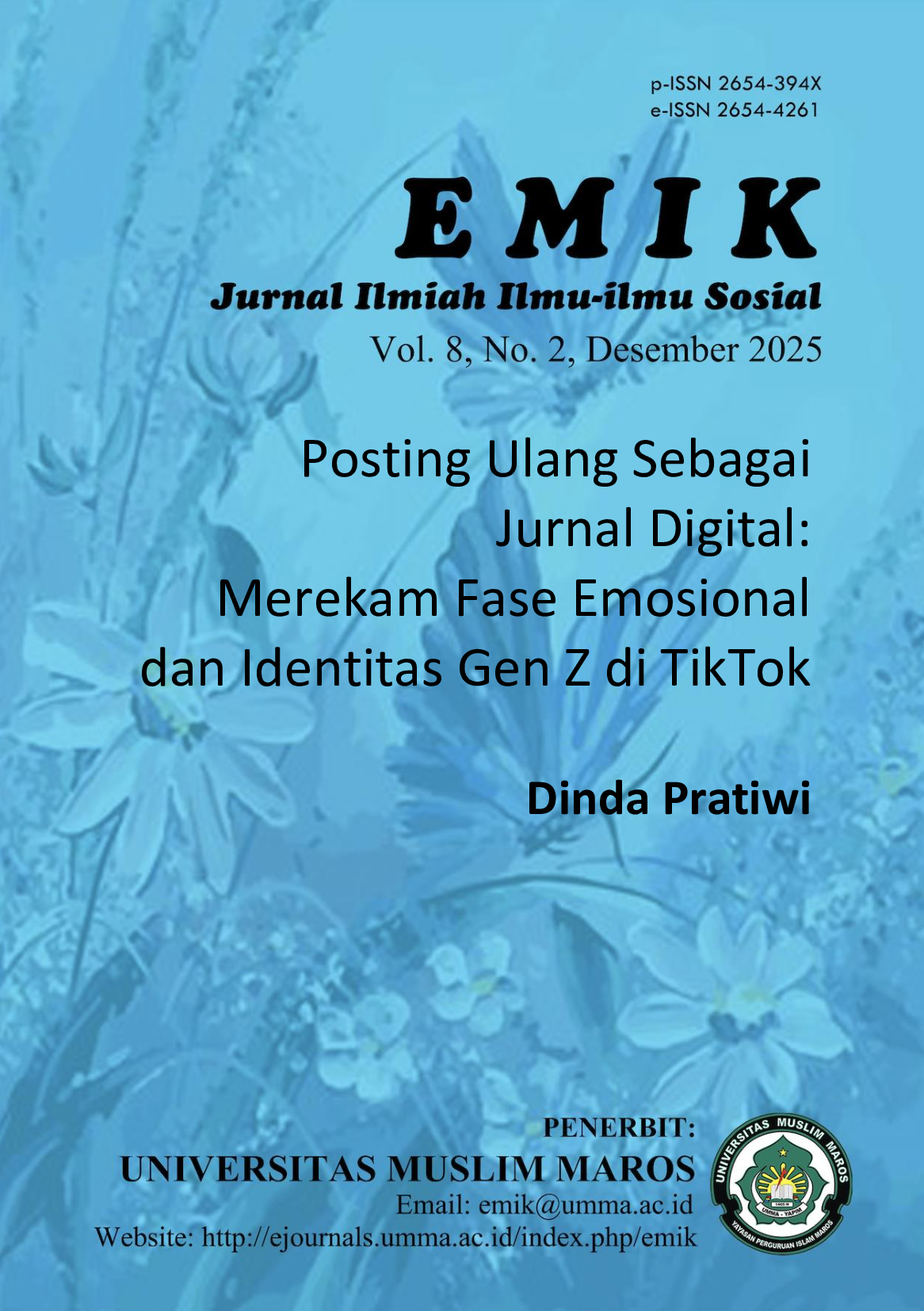Posting Ulang Sebagai Jurnal Digital: Merekam Fase Emosional dan Identitas Gen Z di TikTok
DOI:
https://doi.org/10.46918/emik.v8i2.2786Keywords:
TikTok, Gen-Z, Reposting, Digital Identity, Self-Expression, Indirect Communication, FunctionalismAbstract
This study explores the phenomenon of reposting on TikTok as a form of self-expression and digital identity construction among Generation Z (Gen Z). Although numerous studies have examined Gen Z’s engagement with social media, research focusing on the social functions and cultural meanings of TikTok’s repost feature remains limited. This study seeks to uncover how reposting serves as a medium for indirect communication, emotional regulation, and self-representation within the digital culture of contemporary society.
The research employs a descriptive qualitative method with a phenomenological approach. Data were collected through in-depth interviews and observations involving 13 informants, consisting of nine women and four men aged between 18 and 25 who actively use TikTok’s repost feature. Informants were selected using purposive sampling, limited to users who had engaged with the feature within the past three months to ensure the contextual relevance and experiential accuracy.
The findings reveal that reposting is motivated by various factors, including the desire for self-expression, indirect communication, sharing engaging content, and reflecting personal moods or life phases. The reposted content typically includes entertainment, educational, motivational, humorous, and emotionally relatable videos. This activity performs significant social functions such as reinforcing relationships, seeking emotional validation, and constructing a digital self-image. Positive impacts include emotional relief, a sense of calm, and enhanced social connectedness. However, negative effects were also identified, including misunderstandings, self-image distortion, and tendencies toward social media addiction.
Viewed through Malinowski’s functionalist perspective, reposting represents a form of digital cultural adaptation that enables Gen Z to fulfil their psychological and social needs. TikTok, therefore, serves as a symbolic cultural space where emotions, relationships, and identities are continuously negotiated and expressed through digital means.
References
Abdillah, L. A. (2022). Peranan Media Sosial Modern. https://rie.binadarma.ac.id/file/book/peranan-media-sosial-modern-1668742546.pdf diakses tanggal 9 Oktober 2024.
Afriani, D. (2013). “Perbedaan Penelitian Kualitatif dan Kuantitatif”, dalam A. Satori & A. Komariah (ed.), Metode Penelitian Kualitatif. Bandung: Alfabeta (hlm. 36-37) https://www.scribd.com/document/726164977/2-Metodologi-Penelitian-Kualitatif-Prof-Dr-Djam-an-Satori-MA-dan-Dr-Aan-Komariah-MPd, diakses tanggal 21 Mei 2025.
Ahdiyanti, I. & Waluyati, I. (2021). “Perilaku Keberagamaan Dan Fenomena Media Sosial Tik-Tok Pada Generasi Z,” Sosioreligius: Jurnal Ilmiah Sosiologi Agama, 6(2):74-83, ,https://doi.org/10.24252/sosioreligius.v6i2.27617 diakses tanggal 9 Oktober 2024.
Creswell, J. W. (2012). Educational Research: Planning, Conducting, and Evaluating Quantitative and Qualitative Research (4th ed.). Boston: Pearson Education. https://www.scribd.com/document/713796239/Creswell-2012-educational-research diakses tanggal 9 Oktober 2024.
Divaliani, E. S. & Nurhakim, T. F. (2024). “Persepsi Generasi Z Terhadap Fitur Postingan Ulang Pada Aplikasi Tiktok,” Jurnal Mutakallimin: https://ojs.uniska-bjm.ac.id/index.php/mutakallimin/article/view/14680 diakses tanggal 3 September 2024.
Fathiyah, F. (2023). “TikTok dan Kebebasan Berekspresi di Ruang Digital Bagi Generasi Z.” Medialog: Jurnal Ilmu Komunikasi, 6(1):166-177, http://www.jurnal-umbuton.ac.id/index.php/Medialog/article/view/4139 diakses tanggal 3 September 2024.
Humas TGD. (2024). Simak Sejarah Tiktok dan Perjalanannya Masuk ke Indonesia, https://fresh.trigunadharma.ac.id/detail/simak-sejarah-tiktok-dan-perjalanannya-masuk-ke-indonesia diakses tanggal 24 Februari 2025.
Kemp, S. (2025) Digital 2025: Indonesia,” https://datareportal.com/reports/digital-2025-indonesia diakses tanggal 24 Oktober 2024.
Koentjaraningrat (2014). Sejarah Teori Antropologi I (cet. ke-12). Jakarta: PT RajaGrafindo Persada.
Makassar, B. P. S. K. (2024). Jumlah Penduduk Menurut Kelompok Umur dan Jenis Kelamin di Kota Makassar 2023, https://makassarkota.bps.go.id/id/statistics-table/3/WVc0MGEyMXBkVFUxY25KeE9HdDZkbTQzWkVkb1p6MDkjMw==/jumlah-penduduk-menurut-kelompok-umur-dan-jenis-kelamin-di-kota-makassar--2023.html diakses tanggal 9 September 2024.
Mappasere, S. A, & Suyuti, N. (2019). Pengertian Penelitian Pendekatan Kualitatif, https://www.researchgate.net/profile/Ismail-Wekke/publication/344211045_Metode_Penelitian_Sosial/links/5f5c132ea6fdcc11640bd740/Metode-Penelitian-Sosial.pdf#page=42 diakses tanggal 8 Desember 2024.
Mardianto, D. D. (2023). “Komunikasi Ekspresif Penggunaan Media Sosial TikTok: Studi Kasus Generasi Z Usia 18-23 Tahun,” Ikomik: Jurnal Ilmu Komunikasi dan Informasi, 3(2):50-58, https://jurnal.ut.ac.id/index.php/ikomik/article/view/6481 diakses tanggal 3 September 2024.
Nasir, A.; Nurjana, N.; Shah, K.; Sirodj, R. A. & Afgani, M. W. (2023). “Pendekatan Fenomenologi Dalam Penelitian Kualitatif,” Innovative: Journal of Social Science Research,” 3(5):4445-4451, http://j-innovative.org/index.php/Innovative/article/view/5224 diakses tanggal 20 September 2024.
Putra, Y. S. (2016). “Theoritical Review: Teori Perbedaan Generasi, http://jurnal.stieama.ac.id/index.php/ama/article/view/142 diakses tanggal 21 September 2024.
Rahardjo, M. (2011). Metode Pengumpulan Data Penelitian Kualitatif, http://repository.uin-malang.ac.id/1123/ diakses tanggal 7 Desember 2024.
Safitri, A. A.; Rahmadhany, A. & Irwansyah, I. (2021). “Penerapan Teori Penetrasi Sosial Pada Media Sosial: Pengaruh Pengungkapan Jati Diri Melalui TikTok Terhadap Penilaian Sosial,” Jurnal Teknologi dan Sistem Informasi Bisnis, 3(1):1-9. http://jurnal.unidha.ac.id/index.php/jteksis/article/view/180 diakses tanggal 10 Oktober 2024.
Sari, A. C., Hartina, R.; Awalia, R.; Irianti, H. & Ainun, N. (2018). “Komunikasi dan Media Sosial,” Jurnal The Messenger, https://www.researchgate.net/publication/329998890_KOMUNIKASI_DAN_MEDIA_SOSIAL diakses tanggal 20 September 2024.
Sunyoto, D. (2024). Mengasah Generasi Z: Keterampilan Kunci untuk Bersaing di Era Teknologi dan Kreativitas, https://repository.penerbiteureka.com/publications/567296/mengasah-generasi-z-keterampilan-kunci-untuk-bersaing-di-era-teknologi-dan-kreat diakses tanggal 23 Oktober 2024.
Wea, M.; Letuna, M. A. & Leuape, E. S. (2022). “Aplikasi Tik Tok Sebagai Ajang Ekspresi Diri: Studi Fenomenologi Pada Dosen dan Mahasiswa Ilmu Komunikasi Universitas Nusa Cendana Kupang),” Deliberatio: Jurnal Mahasiswa Komunikasi, 2(2):244-261, https://deliberatio.net/index.php/jikom/article/download/43/43 diakses tanggal 3 September 2024.
Yudiarti, S. (2024). Kebiasaan Online Gen Z Makassar: Potret Generasi Digital Di Kota Anging Mammiri, https://taurungka.makassarkota.go.id/artikel/lihat/konsumsi-media-dan-migrasi-ke-tiktok-mengapa-gen-z-di-makassar-beralih/14cccffd-c217-4be2-820d-024c643e2139 diakses tanggal 09 September 2024.
Zis, S. F., Effendi, N., & Roem, E. R. (2021). Perubahan Perilaku Komunikasi Generasi Milenial dan Generasi Z di Era Digital. Satwika: Kajian Ilmu Budaya dan Perubahan Sosial, 5(1):69-87, https://ejournal.umm.ac.id/index.php/jicc/article/view/15550 diakses tanggal 9 September 2024.

Downloads
Published
Issue
Section
License
Copyright (c) 2025 Dinda Pratiwi

This work is licensed under a Creative Commons Attribution-ShareAlike 4.0 International License.









9.png)















